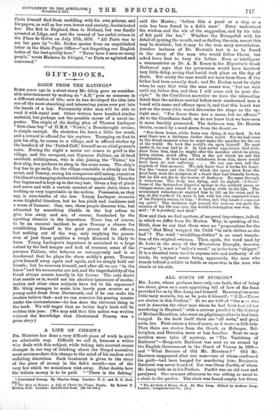A LIFE OF CHRIST.S.
Da. HORTON has done a very difficult piece of work in quite an admirable way. Difficult we call it, because a writer wlio deals with this subject, while taking into account recent changes in our way of thinking about the Gospel narrative, must accommodate this change to the mind of his readers with unfailing discretion. Such treatment is given to the story of the piece of money in the fish's mouth—one of the very few which we sometimes wish away. Peter doubts how the tribute money is to be paid. " There is the fishing,' • Contraband Tommy. By Charles Gleig. London: T. C. and E. C. Jack. [56.1 t The Hero of Heroes: a Life of Christ for Young People, By Robert F. Horton, D.D. London : Jarrold and Sons. [Se. 6d. net.]
said the Master ; before this a pearl or a ring or a coin has been found in a fish's maw.' Peter understood the wisdom and the wit of the suggestion, and by his take of fish paid the tax." Whether the Evangelist with his detail of opening the mouth, and so finding the coin, meant this may be doubted; but it may be the true story nevertheless.
Another instance of Dr. Horton's tact is to be found in the story of the man who would follow Christ, but asked leave first to bury his father. Even so intelligent
a commentator as Dr. A. B. Bruce in the Expositor's Greek Testament says that the permission would have involved
very little delay, seeing that burial took place on the day of death. But surely the man would not have been there if the father had been actually dead ; and Dr. Horton must be right when be says that what the man meant was, "Let me wait until my father dies, and then I will come and be your dis- ciple." In the Crucifixion narrative we have the interesting detail that the soldiers carried before each condemned man a board with name and offence upon it, and that this board was put on the cross (this would determine the shape as the up- right one). "For Jesus there was a name, but no offence." As to the Crucifixion itself, we do not know that we have seen it more forcibly presented. The darkness was, Dr. Horton thinks, caused by a sand storm from the desert :—
" For three hours, while Jesus was dying, it was dark. In his soul there was a darkness darker than night. For he had come to the dread moment when he must make the sacrifice for the sin of the world. He took the world's sin upon himself. He sank under it, he was lost in it. In that awful experience God with- drew from him, that he might offer the sacrifice which he alone, being sinless, could offer. This is the act which we call the Propitiation. If God had not withdrawn from him, there would have been no real suffering. . . . No one can ever tell the anguish of that moment. We only know that it broke his heart. For the ' water and the blood' which the spear drew from the dead body were the symptom of a heart that had literally broken. But he did not die in the horror of darkness. He came through it victorious. The body was dying, and he sighed: 'I thirst.' Some of the bystanders dipped a sponge in the soldiers' posea, or vinegar-water, and raised it on a hyssop stalk to his lips. The momentary refreshment enabled him to lift up his voice, and to say, in the words of Ps. xxxi. 5, but with his own reassured sense of his Father's return to him: 'Father, into Thy hands I commend say spirit.' The darkness had passed, the ransom was paid, tho mission of hie life was over, the world's redemption was won. He said : 'It is finished,' and died."
Now and then we find matters, of no great importance, indeed, in which we differ from Dr. Horton. Why, in speaking of the Birth, does he say that there were no "preparations for the event," that Mary wrapped the Child "in such clothes as she had " P The word "swaddling-clothes" is an exact transla-
tion of the original crIrcfp7ava. Then, again, the -word used by St. Luke in the story of the Miraculous Draught, /via-Tarns
(" master "), is not a " sailor's word," as is the term "skipper." It is a classical term used to express rule and authority of all kinds, its original sense being, apparently, the man who
stands behind a soldier in battle as Taparrreirris is the man who stands at his side.






































































 Previous page
Previous page